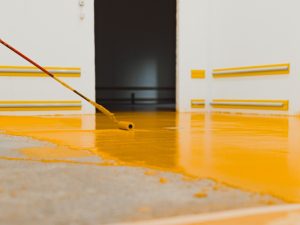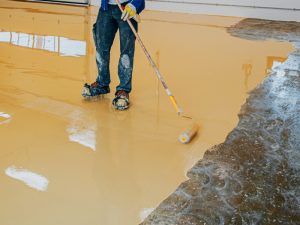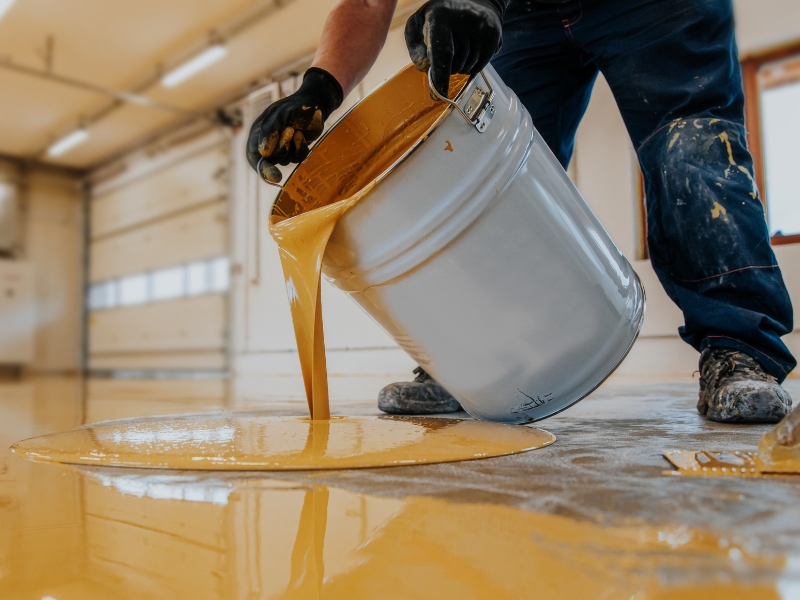What makes epoxy flooring ideal for high-traffic garages?
How does epoxy flooring compare to other flooring options for garages?
Epoxy flooring has distinct advantages over other types of garage flooring. Here’s how it compares to common alternatives:
- Concrete: While concrete is durable, it’s porous and can stain easily. Epoxy floors provide a smoother, easier-to-clean surface with added durability.
- Tiles: Ceramic or vinyl tiles can crack under heavy loads, whereas epoxy flooring is crack-resistant and can be customised to create a seamless look.
- Rubber mats: Rubber mats are easy to install and are great for cushioning, but they’re prone to wear and tear, especially under heavy use. Epoxy flooring offers a long-lasting, robust solution.
- Paint: Garage floor paints can peel and fade over time, while epoxy coatings provide superior adhesion, colour retention, and protection against the elements.
What are the different types of epoxy flooring used in high-traffic areas?
Not all epoxy flooring is created equal. Here are some of the most common types of epoxy flooring suitable for high-traffic garages:
- Solid epoxy flooring: The most common type, solid epoxy, is incredibly durable and ideal for high-traffic areas. It provides a thick, protective layer resistant to wear and tear.
- Water-based epoxy flooring: A more affordable option, water-based epoxy is suitable for residential garages with lighter traffic but may not be as durable as solid epoxy.
- Solvent-based epoxy flooring: Known for its strength, solvent-based epoxy is perfect for commercial garages or spaces with very high traffic.
- Quartz-filled epoxy flooring: This option offers added toughness, ideal for high-traffic areas, and provides a decorative finish.
- Metallic epoxy flooring: Perfect for a unique, high-end look, metallic epoxy withstands light to moderate traffic.

How can you choose the best epoxy flooring for your garage’s needs?
Choosing the right epoxy flooring for your garage depends on several factors. Here’s how you can make an informed decision:
- Safety benefits: To enhance safety, especially in garages prone to spills, choose epoxy with a non-slip additive to reduce the risk of slips and falls from slippery surfaces.
- Traffic volume: If your garage receives heavy traffic, you’ll need a more durable epoxy, such as solid or solvent-based epoxy.
- Durability: Consider the weight of the vehicles and the type of activities that take place in the garage. If you use it as a workshop, extra protection may be necessary.
- Aesthetic preferences: For a sleek, modern look, opt for metallic or quartz-filled epoxy for a decorative touch.
- Budget: High-performance epoxies may have a higher initial cost, but they offer long-term savings in repairs and maintenance.
- Ease of maintenance: Choose a non-porous, easy-to-clean epoxy-like solid epoxy for low-maintenance floors.
Why does surface preparation matter for high-traffic garage epoxy coating?
Before installing epoxy flooring, it’s crucial to prepare the garage floor properly to ensure the best adhesion and durability. Here’s why surface preparation matters:
- Improves longevity: A well-prepared floor helps achieve long-lasting epoxy garage floors by ensuring the coating adheres firmly to the surface, even under heavy use.
- Prevents cracking: Proper preparation removes any contaminants that could prevent the epoxy from bonding correctly to the concrete surface, reducing the risk of cracks.
- Enhances aesthetics: Surface preparation removes imperfections, such as stains and cracks, ensuring the final epoxy finish looks smooth and even.
What are the key features of epoxy flooring for garage durability?
When choosing epoxy flooring for a high-traffic garage, you want to ensure that the material is durable and can handle the demands of your space. Here are some key features to look for:
- Chemical resistance: Epoxy floors withstand harsh garage chemicals like cutting fluid, oil and petrol.
- Slip resistance: To maximise the safety benefits of epoxy flooring, consider adding a non-slip additive, especially in garages prone to spills.
- Impact resistance: The flooring should resist damage from dropped tools or heavy items.
- Wear resistance: Epoxy should endure foot traffic and vehicle movement without showing signs of wear.
- Seamless finish: Epoxy reduces the risk of dirt buildup from grout lines or cracks.

When should you consider professional installation for your epoxy garage coating?
While some homeowners might consider DIY epoxy flooring, professional installation is often the best choice for the following reasons:
- High-quality finish: Experienced installers can achieve a flawless, even finish that DIY installations might need more.
- Expertise in surface preparation: For optimal results, professional garage epoxy flooring service ensures the floor is appropriately cleaned, ground, and repaired before applying the epoxy.
- Time-saving: Installing epoxy flooring is time-consuming, and professionals can get the job done more efficiently, saving you time and hassle.
Sydney Wide Epoxy Flooring is the top choice for garage epoxy flooring, offering quality, expertise, and durability. We use premium-grade materials and precise installation techniques to create flawless, long-lasting floors that withstand heavy use. Our team follows all Australian and Sydney regulations, ensuring a safe, compliant finish. With customised solutions to match your style, we transform your garage with reliable, high-performance epoxy flooring. Contract Sydney Wide Epoxy Flooring today!

